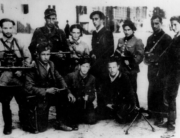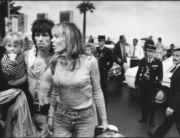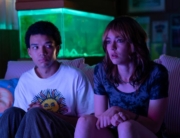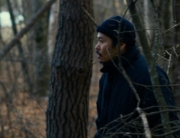

Biographies and biopics do not necessarily do their subjects any favors. Of course, they are not always intended to—many, when the facts of their lives are laid bare, do not emerge as admirable—yet so often an attempt at biography fails to bring to life what we sense was the subject’s spirit. These documentaries feel, fundamentally, not in keeping with those they describe or depict, and audiences are likely to leave the theater with much less interest in this person’s life than they initially had.
Luckily, Werner Herzog’s Nomad: In the Footsteps of Bruce Chatwin has a fresh and invigorating approach to its subject. It’s not a straightforward biography, or a biography period, of British writer Bruce Chatwin but a tribute to his many fascinations and his restless curiosity. In doing so, Herzog ignites a similar curiosity in the viewer regarding Chatwin’s writing and the person that he was.
Chatwin was known for novels such as The Viceroy of Ouidah (1980), which Herzog filmed as Cobra Verde (1987), as well as In Patagonia (1977) and The Songlines (1987), both experimental yet best-selling nonfiction works exploring his fascination with prehistory, early man, and travel. Herzog’s objective as a filmmaker is to take a tour of Chatwin’s obsessions. So in the first section, Herzog visits the cave in South America where Chatwin ventured to trace the “hide of brontosaurus,” which his grandmother’s cousin found there many decades earlier.
Chatwin writes of these travels in In Patagonia, and the brontosaurus hide was later discovered to be actually that of a giant sloth. In this section and in those following, Herzog captures the grandeur of the Chilean landscape and examines important objects, such as the brontosaurus skin, in tantalizing detail, and he films others (in this case, tourists) relating to the environment. Interspersed are interviews with Nicholas Shakespeare, Chatwin’s biographer, and those who knew the writer, but the dialogue never overpowers the visuals. They complement one another in seamless balance.
We visit the Neolithic structures near where Chatwin grew up in Wales, which stimulated his childhood interest in the origins of humans. In Australia, Chatwin met with Aborigines and studied their ancient tradition of mapping the landscape through songs known as songlines. He also studied some of the last remaining nomadic people in Chile and Patagonia. Herzog does not so much summarize what Chatwin did in these locations as to attempt to reengage with what drew Chatwin there. For instance, in Australia, we spend as much time, if not more, listening to Aborigines and anthropologists than learning about Chatwin’s book that resulted from his experiences there. This is a strong approach, which encourages infectious curiosity.
The film’s pace flags a bit when Herzog moves into new territory, that of his relationship with Chatwin. Subsequent sections deal with what drew the two of them together—how Chatwin gifted Herzog with his rucksack before he died and their collaboration on Herzog’s Cobra Verde. It might lose steam because the previous sections deal so powerfully with mankind’s relationship to its origins and the landscape. That being said, if the film loses momentum, it doesn’t lose that much. Herzog and Chatwin were kindred spirits, and the juxtapositions between them are fascinating. Furthermore, one can hardly object to any excuse to watch clips from Cobra Verde, a dense, wild, baffling film and actor Klaus Kinski and Herzog’s final collaboration, which Chatwin observed, ill with AIDS, from the sidelines.
The Songlines has become a controversial text since Chatwin published it, with differing views about the way he portrayed the Aborigines, and Herzog does not address the controversy. Doubtless this will disappoint some viewers. However, Herzog is respectful in his depiction of the Aborigines.
All in all, Nomad is a tremendous, idiosyncratic effort. It’s biography as the opening of doors rather than the assertion of a definitive take. In making this film, Herzog has done his subject and his audience a tremendous favor.






Leave A Comment